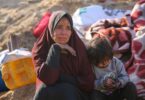Lamia Sameen Malik
Statistically 32% of primary school age girls are out of school in Pakistan, as compared to 21% of boys of equal age. By grade six, 59 percent of girls are out of school, versus 49 percent of boys. Sadly, only 13 percent of girls are still in school by 9th grade. Both genders are devoid of essential education in staggering numbers, but girls are worst affected. These statistics have further been confirmed by the Human Rights Watch.
For decades, the children of Pakistan have been plagued by a failing educational system. Despite years of restructuring and attempted overhauls, the country’s education system continues to lack sufficient teachers and institutions for our people. Consequently, millions of children may never achieve literacy, or pursue substantial education beyond primary schools.
The lack of schooling and vocational training puts nearly half the future adult population of Pakistan at a severe disadvantage for improving their circumstances, pursuing a career, or increasing their income, all of which lead to a crippling economic growth for the nation as a whole.
To make matters worse, historic and current gender-disparate educational issues exist, especially in some of Pakistan’s provinces that are more rural. Nationwide, 55% of out-of-school children are girls. Where shockingly, the top-cited reason for a lack of attendance is the persistence of parents who do not allow their daughters to pursue education. Whereas the boys simply opt out of schools to become contributing bread winners.
Education is a fundamental tool for building human capabilities, finding lucrative employment, and acquiring the knowledge essential for developing individuals and societies. It comes as a lump in my throat, knowing that there are deep separations based on regional disparities, rural-urban locations, gender, income and wealth of parents, medium of instruction in schools, curriculum and programs, rift in beliefs, type of schools and obtainability of extra coaching or tuition centers. While individuals, societies, the state and principally the world as a whole can prosper through educating our children. Yet, an educational reform to improve people’s socio-economic development is largely ignored or fails to be implemented at the national scale that is required.
Education has been branded as a fundamental human need for young people. It is a basic human right. Contrary to the popular perception depicted in the western world, Islam heavily emphasizes on education.
The right to education provides a gateway to quality schools and a pathway towards the full development of the human personality. It does not serve a purpose of being a transferable skill but it is present for human flourishing. As Benedict XVI said, ‘dignity of education lies in fostering true perfection and happiness of those to be educated.’ On a whole education coerces two responsibilities: one accounts for developing human personality, self-actualization, independence, progressiveness, and the willingness to participate in all aspects of human development while the other plays a critical role in achieving economic, social and cultural growth.
Nevertheless, educational opportunities in Pakistan are factored upon family, wealth, region or influence rather than capabilities.
In my opinion, we are at a potential turning point. All of Pakistan’s challenges can be tackled best by harmonized and collaborative approaches that tie public, private sector, and citizen efforts. With one in ten of the world’s school children residing in Pakistan, the nation is tasked with educating and empowering a huge percentage of prospect global citizens. Let us join to make a positive impact on the lives of the girls and boys. Their access to primary and higher education could benefit the future of the planet.






